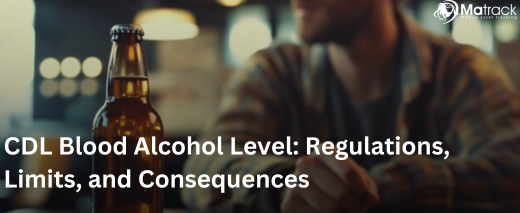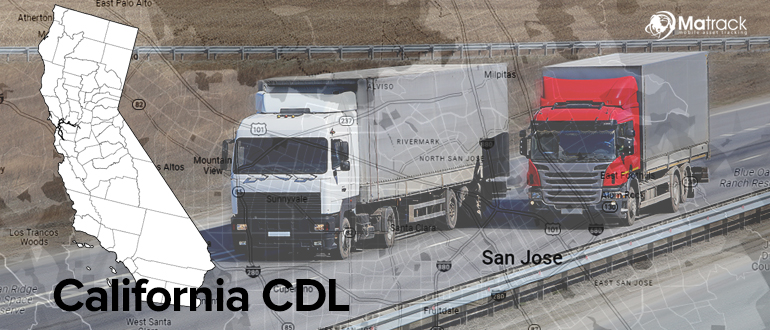Key Takeaways:
- CDL drivers are legally intoxicated at a 0.04% blood alcohol concentration (BAC) when operating a commercial motor vehicle.
- A DUI in a personal vehicle at 0.08% BAC can still lead to CDL suspension or disqualification.
- CDL holders are subject to random, post-accident, and reasonable-suspicion alcohol testing under federal DOT rules.
- Alcohol violations commonly result in license suspension, job termination, CSA score damage, and higher insurance costs.
- The most effective way to protect a CDL is avoiding alcohol before duty and following FMCSA and employer policies.
What Is the Legal Blood Alcohol Limit for CDL Drivers?
The legal blood alcohol concentration (BAC) limit for CDL drivers is 0.04% when operating a commercial motor vehicle, as defined by the Federal Motor Carrier Safety Administration (FMCSA) under the Federal Motor Carrier Safety Regulations (FMCSR).
This limit is half the legal threshold for non-commercial drivers, who are considered intoxicated at 0.08% BAC. The lower standard applies only while driving a commercial vehicle, but violations carry significantly harsher penalties, including immediate out-of-service orders and CDL disqualification.
Because commercial vehicles require greater control, longer stopping distances, and faster reaction times, federal regulators treat any measurable impairment as a serious safety risk. As a result, even minimal alcohol consumption can place a CDL driver over the legal limit while on duty.
What Are the Key Alcohol Regulations for CDL Drivers?
Alcohol regulations for CDL drivers are designed to prevent impairment during safety-sensitive work and to ensure consistent enforcement across commercial transportation. These rules apply nationwide and are enforced through FMCSA and DOT safety regulations.
- BAC Threshold: Federal law considers a CDL driver impaired at 0.04% blood alcohol concentration when operating a commercial motor vehicle.
- Zero Tolerance: While on duty or in physical control of a commercial vehicle, any detectable amount of alcohol is prohibited.
- Pre-Duty Restriction: Alcohol use is not permitted within four hours before a driver begins safety-sensitive driving duties.
- Implied Consent: CDL holders are required to comply with alcohol testing when conducted under DOT and FMCSA authority.
- Personal Vehicle DUI: A DUI conviction in a non-commercial vehicle at 0.08% BAC or higher can still place a driver’s CDL at risk.
Can a CDL Driver Get a DUI in a Personal Vehicle?
CDL holders can be charged with a DUI while driving a personal vehicle, and the case is evaluated under the standard 0.08% BAC limit used for non-commercial drivers. The difference for professional drivers lies in how the conviction affects their licensing, because any DUI has the potential to extend beyond a personal driving record.
Once a conviction is entered, commercial driving regulations allow the offense to influence the status of a CDL. Penalties may include suspension or, in more serious cases, disqualification, and these outcomes apply even when the individual was off duty and operating a private vehicle. The key issue is how regulators interpret the event in relation to safety-sensitive responsibilities.
Many drivers assume the separation between personal driving and commercial licensing offers some protection. In practice, both are evaluated together, and a DUI in any context is viewed as a sign of impaired judgment. This is why an off-duty incident can still affect a CDL holder’s ability to continue in a commercial driving role.
How Are CDL Drivers Tested for Alcohol Under FMCSA Rules?
Alcohol testing for CDL drivers is carried out under federal DOT and FMCSA requirements to ensure that safety-sensitive work is performed without the influence of alcohol.
Pre-Employment Testing
Employers may require alcohol testing before placing a driver into a safety-sensitive role. This helps confirm that applicants meet compliance expectations prior to operating a commercial motor vehicle.
Random Testing
Drivers can be selected for testing at any point during the year through a federally approved random selection process. Once notified, the driver must report immediately for testing.
Post-Accident Testing
Testing is required when certain crash-related conditions are met, such as a fatality or an injury that needs medical attention. The timing rules are strict, and failure to complete testing within the required window can be considered a violation.
Reasonable Suspicion Testing
Supervisors trained under DOT guidelines may request testing when specific observations suggest alcohol use. Behavioral signs, appearance, or odor can serve as grounds for this type of assessment.
Return-to-Duty Testing
Drivers who have violated alcohol regulations must complete a return-to-duty process before resuming safety-sensitive responsibilities. An evaluation by a Substance Abuse Professional (SAP) is required, followed by a monitored test confirming readiness to return.
What Methods Are Used to Measure Alcohol in CDL Drivers?
Breathalyzer Test
A breath test provides a quick reading of blood alcohol concentration and is widely used in both roadside and workplace testing environments.
Blood Test
Blood testing offers the most accurate measurement of alcohol concentration. It is often used when precise results are necessary or when other testing methods are not suitable.
Urine Test
Urine testing is not typically used to measure current alcohol impairment. It is more commonly used to detect controlled substances as part of standard compliance programs.
What are the Consequences of Violating CDL BAC Limits?
Driving a commercial vehicle with a BAC of 0.04% or higher comes with serious consequences that can affect your career, finances, and legal record. Here’s what happens if you violate CDL alcohol regulations:
CDL Suspension and Revocation
- First-time offenders face a one-year CDL suspension. If you were transporting hazardous materials, the suspension increases to three years.
- A second offense results in a lifetime disqualification from holding a CDL. Some states allow reinstatement after 10 years, but only under strict conditions.
Legal Penalties
- CDL DUI charges come with fines ranging from $500 to $5,000, depending on state laws.
- Some states require mandatory jail time, even for a first offense.
- Courts may order you to complete alcohol education or rehabilitation programs before reinstating your license.
- Refusing a BAC test can lead to an automatic one-year CDL suspension, even if you weren’t over the limit.
Employment Consequences
- Most trucking companies have a zero-tolerance policy for alcohol violations, meaning you’ll likely be fired immediately.
- A CDL DUI makes it extremely difficult to get hired by reputable carriers. Many companies won’t consider drivers with a DUI on their record.
- If you do find another job, expect lower pay and limited driving opportunities for several years.
CSA Score Impact
- A DUI or BAC violation hurts your CSA (Compliance, Safety, Accountability) score, which trucking companies and insurance providers monitor closely.
- The FMCSA assigns points based on violations. A DUI adds serious points, making you a high-risk driver.
- A poor CSA score means fewer job opportunities and higher insurance costs.
Increased Insurance Costs
- A CDL DUI will make your insurance rates skyrocket, sometimes doubling or tripling.
- Some insurers refuse to cover drivers with a history of alcohol violations, making it nearly impossible to stay in the industry.
- If you can get coverage, expect higher deductibles and more restrictions.
Criminal Record and Long-Term Consequences
- A CDL DUI stays on your permanent criminal record, affecting background checks for jobs, housing, and professional licenses.
- Future employers, even outside the trucking industry, may not hire you due to a DUI conviction.
- If your BAC was very high or you caused an accident, you could face felony charges, leading to longer jail time and steeper fines.
Read More: DOT Requirements And Regulations For CDL Truck Drivers
How to Avoid CDL Alcohol Violations?
Preventing BAC violations is about awareness, discipline, and planning. Here’s how to stay compliant and protect your CDL:
Know the BAC Limits and Employer Policies
- Company rules: Some trucking companies have a zero-tolerance policy (0.00% BAC)—always check your employer’s guidelines.
- State variations: Some states impose stricter penalties, even in personal vehicles.
Avoid Alcohol Before a Shift
- Stop drinking at least 12 hours before work to prevent residual BAC.
- Read medication labels—some cold and cough syrups contain alcohol.
- Use an at-home breathalyzer if unsure.
Be Cautious with Off-Duty Alcohol Use
- A DUI in a personal vehicle affects your CDL—penalties apply across all driving records.
- Never “sleep it off” in a vehicle—being inside a car while intoxicated can still result in a DUI.
- Watch for public intoxication laws—certain charges can flag safety concerns with employers.
Stay Ahead of Testing Procedures
- CDL drivers are subject to random, post-accident, and suspicion-based BAC tests.
- Refusing a test results in an automatic CDL suspension.
- Dispute inaccurate results through FMCSA’s DataQ system if needed.
Use Alternative Transportation if Drinking
- Plan ahead: rideshare, taxis, or staying overnight are better than risking your CDL.
- If attending an event with alcohol, have a designated driver.
Seek Support Before It’s Too Late
- Employers offer substance abuse programs (SAPs) for confidential support.
- CDL sobriety programs and Alcoholics Anonymous (AA) provide structured help.
- Address concerns before a violation damages your career.
Frequently Asked Questions
What is the legal alcohol limit for CDL drivers in a personal vehicle?
The legal BAC limit is 0.08% for CDL holders driving a personal vehicle. However, a DUI in a personal vehicle can still result in a CDL suspension or revocation, depending on state laws.
Can a CDL Holder Drink Alcohol When Off-Duty?
Yes, CDL holders can consume alcohol while off-duty. However, they must ensure a minimum of four hours passes before driving a commercial vehicle.
What Happens if a CDL Driver Refuses a BAC Test?
Refusing a BAC test leads to an automatic one-year CDL suspension, even for a first offense.
Can a CDL Holder Get a DUI in Their Personal Vehicle?
Yes, CDL holders face severe consequences if convicted of DUI in their personal vehicle. A 0.08% BAC in a personal car can result in CDL suspension.
Are CDL Alcohol Laws Stricter Than Regular DUI Laws?
Yes, CDL alcohol laws are twice as strict as those for non-commercial drivers, with a 0.04% BAC limit and harsher penalties.
Final Thoughts
CDL alcohol regulations exist to protect both drivers and the communities they serve, and the consequences for violations reflect the level of responsibility involved in operating commercial vehicles. Understanding the limits, testing requirements, and potential penalties gives drivers a clearer picture of what is at stake any time alcohol and commercial driving intersect.
Responsible decision-making plays the greatest role in preventing issues before they occur. By staying informed, planning ahead when drinking off duty, and adhering to federal and employer guidelines, CDL holders can protect their licenses, maintain professional standing, and continue performing safety-sensitive work with confidence.



